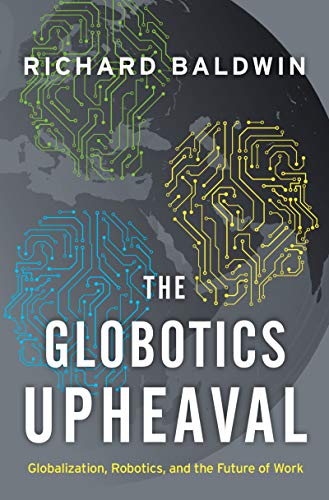AI Fear Factor: White Collar Jobs in Crosshairs, Cash-free Retail Banned, Breaking up the FAANGS

via Shutterstock
Though in its infancy, AI already is powerful – or potentially powerful – enough to have raised not only public awareness but also anxiety, spurring responses from policy makers, politicians and public intellectuals concerned about those who could be hurt or left behind by oncoming AI omnipresence.
For AI-related technology companies, the risk in all this is regulatory intervention by government – i.e., by politicians, famous in how they respond to emerging industries and new technologies for initially doing too little, then too much.
Along this line, the most important development this week in the AI firmament was a new law passed by the Philadelphia City Council running counter to the time when we all live like aristocrats: never carrying money. The Council voted to make Philadelphia the first major American city to ban cashless retail stores. The law doesn’t ban cashless check-out, but it requires retail outlets to include acceptance of cash in some of its check-out lines. In New York, at least one City Council member has proposed a similar law, while the New Jersey state legislature approved a bill banning no-cash retail stores across the state (the governor has yet to announce whether he will sign it into law). Massachusetts has already passed such a law.
These measures fly in the face of efforts by Amazon and its growing brick-and-mortar retail presence, along with startups like AiFi (see “Nvidia Inception Awards: AI Start-ups Pushing Innovation”), to use AI and other automation technologies to lower retail labor costs and, it’s hoped, streamline the customer experience with cash-free check-out. For example, Atlanta’s Mercedes-Benz Stadium, home of the Atlanta Falcons, will be the first NFL stadium to go fully cashless to accelerate payment and cut down on lines at concession stands.
In Philadelphia, New Jersey and Massachusetts, the cash-free measures are “an attempt to strike a balance between equity for lower-income consumers and merchants’ eagerness to embrace technological advances,” the Wall Street Journal reported yesterday, noting that 26 percent of Philadelphians live below the poverty line. In addition, some consumers with cards (or phones with mobile payment) prefer to use cash for privacy reasons.
In response to the move by the Philadelphia City Council, Amazon has voiced concern about “the impact on its ability to open cashierless Amazon Go convenience stores in the city,” according to the Journal.
Amazon, along with FAANG counterparts Facebook and Alphabet (Google), may also soon voice concerns about a proposal raised by Democratic Party presidential candidate Elizabeth Warren, who today called for the break-up of “big tech.”
In a blog posted today, Warren stated, “Today’s big tech companies have too much power—too much power over our economy, our society and our democracy. They’ve bulldozed competition, used our private information for profit and tilted the playing field against everyone else. And in the process, they have hurt small businesses and stifled innovation. …my administration will make big, structural changes to the tech sector to promote more competition—including breaking up Amazon, Facebook, and Google.”
Today’s blog is consistent with Warren’s longstanding criticism of antitrust enforcement by the Justice Department and the Federal Trade Commission. And though her declaration did not directly touch on AI, she did call for restrictions on the use of data – which amounts to the same thing.
“We must give people more control over how their personal information is collected, shared, and sold –” she said, “and do it in a way that doesn’t lock in massive competitive advantages for the companies that already have a ton of our data.”
The AI fear factor is stirring intellectual circles as well. The Wall Street Journal published a review of an important new book by international trade expert Richard Baldwin, of the Graduate Institute, Geneva, in which he asserts that, having automated many blue collar work tasks and jobs, AI in alliance with globalization “will soon go after white-collar jobs with a vengeance.”
“We need to stop asking whether the economic impact is due mostly to globalization or mostly to automation,” Baldwin writes. “Globalization and robotics are now Siamese twins—driven by the same technology and at the same pace.”
Baldwin cites the outsourcing of work to freelancers to Asia and eastern Europe, which often involves computer programming, while freelance engagements involving advanced language skills typically require those for whom English is the first language.
“Enter artificial intelligence,” stated reviewer Marc Levison, “which over the past two or three years has vastly improved the quality of written translation and enabled computers to ‘understand’ and ‘speak’ like a native. Very soon, workers in far-flung locations will be able to write in one language and have their missive delivered promptly in another, and to participate in a meeting with real-time interpretation that expresses their thoughts in the vernacular of colleagues at the home office.”
“With machine translation being so good, and getting better so fast,” Baldwin writes, “the billion who speak English will soon find themselves in much more direct competition with the other six billion who don’t.”
Meanwhile, the New York Times published two stories focused on AI ethics – one casting doubt on its likelihood, “Is Ethical A.I. Even Possible?” and citing, among other issues with potential for causing controversy, the use of AI by the military. On the remediation side, the Times also published “Seeking Ground Rules for A.I.” offering 10 steps for encouraging the ethical use of artificial intelligence.
“As activists, researchers, and journalists voice concerns over the rise of artificial intelligence, warning against biased, deceptive and malicious applications, the companies building this technology are responding. From tech giants like Google and Microsoft to scrappy A.I. start-ups, many are creating corporate principles meant to ensure their systems are designed and deployed in an ethical way. Some set up ethics officers or review boards to oversee these principles.”
However, the article casts doubt on AI vendors’ adherence to ethical standards when profits are at stake.
“….tensions continue to rise as some question whether these promises will ultimately be kept,” states the article. “Companies can change course. Idealism can bow to financial pressure. Some activists — and even some companies — are beginning to argue that the only way to ensure ethical practices is through government regulation.”
To ward off the potential dark side of AI, the ground rules article offers suggestions for dealing with such issues as transparency, data disclosure and privacy, diversity, bias and accountability, among others.













